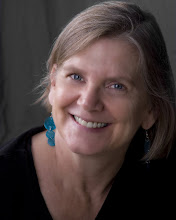I've seen two movies lately, Michael Clayton and Before the Devil Knows You're Dead, that play with the narrative--move forward, then go back and move forward again, covering only a few days.
Narrative interruptus is how Roger Ebert, describes Before the Devil Knows You're Dead. "The . . .screenplay. . .takes us up to a certain point, then flashes back to before that point, then catches us up again, then doubles back, so that it meticulously reconstructs how spectacularly and inevitably this perfect crime went wrong."
We hold our breath, knowing what's coming but, still--the suspense. Phew. With each replay we understand more, see more deeply into the characters, learn more about relationships, notice new details, cringe--again--at what's coming.
We want to shout: STOP. DON'T DO THAT!
La Vie en Rose, the movie about Edith Piaf', begins at the end of her tragic life then jumps back to the beginning before filling in the middle--in a helter skelter way. The chaotic time sequences seem to mirror Piaf's crazed, druggy life.
In a novel or a memoir, the reader can get cranky, jerking back and forth. Although everybody I know seems to have loved it, I gave up on The Time Traveler's Wife. Reading at night before dropping into sleep, I couldn't keep straight which time period we were in, and I got lazy about checking back to figure it out. My enduring memory is of a man being catapulted through the decades and landing in a garden or a museum, always naked.
I was a moody teenager, with long stretches of blank time, when I read Lawrence Durrell's The Alexandria Quartet. Three of the four books examine the same sequence of events from different characters' points of view. You understand everything one way and then, oops! Wow. Here's another take. The fourth book moves everybody forward in time. I drooled over every page.
In real life, we relive the past in our memories--and by writing.
When I was revising the memoir I wrote about my son's life and death, Losing Malcolm, I would get stuck in spots, not want to turn the page. "No," I would say, "I don't want that to happen. I want a different ending."
But just like in the narrative interruptus books and movies, no matter how many times I revisited the scene, I couldn't change the outcome; I could only learn more about what was going on.
And keep writing.
skip to main |
skip to sidebar

Join Carol Henderson to exchange ideas about writing.
To Return to my Website
About Me

- Carol Henderson
- My goals--as a teacher, coach, and speaker--are to help others find fresh meaning in personal experience, discover their unique voices on the page, and shape their life stories into compelling nonfiction.
1 comment:
Some people argue that narrative time--beginning, middle, end--is just as much of a construct for viewing reality as the back & forth model. If you agree with that, it's not too big a stretch to imagine future humans longer locked into one way of experiencing time and life, but able to choose from several at any given time.
Post a Comment